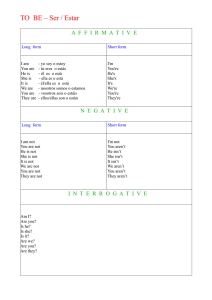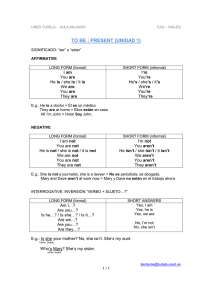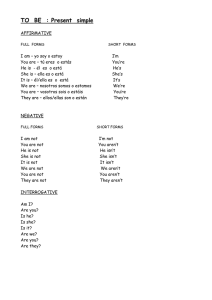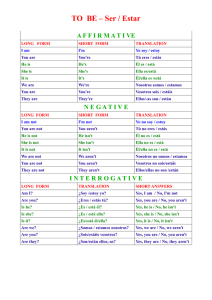apuntes inglés I 2006- 2007.doc
Anuncio
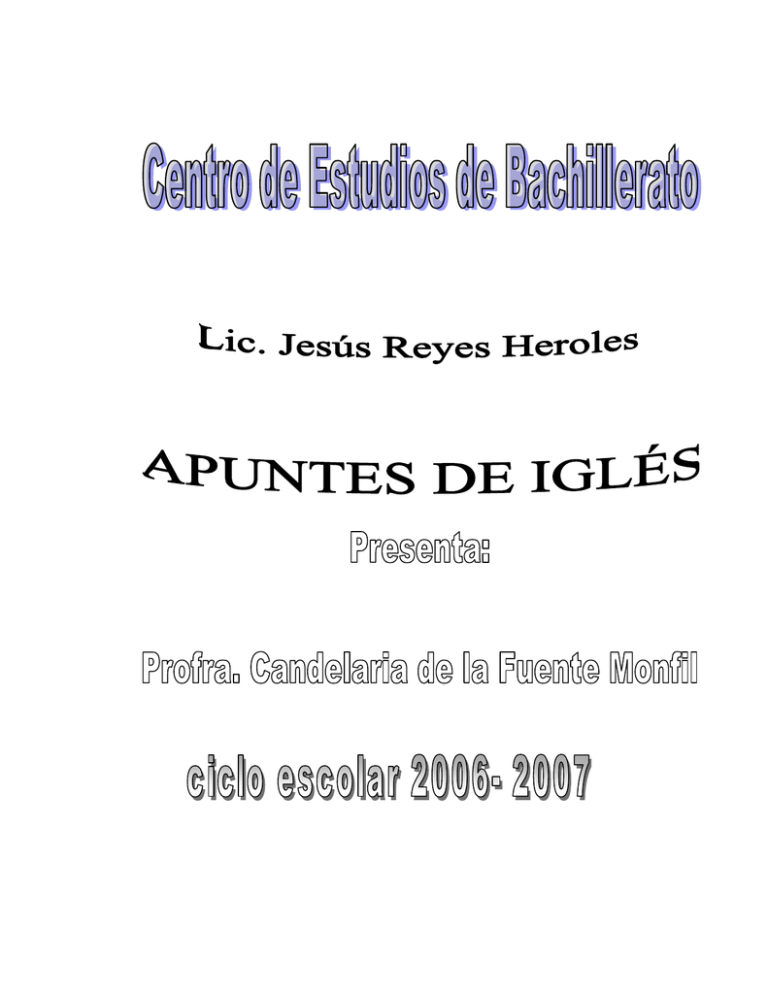
JUSTIFICACIÓN Con la finalidad de brindar un apoyo más amplio a los estudiantes del Centro de Estudios de Bachillerato “Jesús Reyes Heroles”, se presentan los apuntes de Lengua Adicional al Español I, estos están diseñados para resolver las necesidades básicas de gramática de los estudiantes del CENTRO DE STUDIOS DE BACHILLERATO. Con éstos se pretende que los alumnos aprendan a describir, narrar, informar, especular, argumentar, dialogar entre otras actividades, además de prestar atención a las características intrínsecas del lenguaje escrito y entender las funciones comunicativas. Estos apuntes responden también a las necesidades que tiene el estudiante de bachillerato de contar con herramientas que le permitan integrarse de manera armónica, útil en las clases de inglés, UNIDAD I OBJETIVO 1.I El alumno practicará saludos en contextos formales y no formales. OBJETIVO 1.2 El alumno se presentará así mismo y atrás personas en distintas situaciones. OBJETIVO 1.3 El alumno intercambiará información general de carácter personal. OBJETIVO 1.4 El alumno solicitará información general acerca de terceras personas en distintas situaciones. TO BE AFIRMATIVE VERB NEGATIVE INTERROGATIVE I am Iam not / I’m not am I? am not I? You are you are not/ you’re not are you? Aren’t you He is he is not / he isn’t is he? Isn’t he She is she is not/ she isn’t is she? Isn’t she? It is it is / it isn’t is it? Isn´t it? We are we are not / we aren’t are we? Aren’t we? You are you are not/ you aren’t are you? Aren’t you? They are they are not / they aren’t are they? Aren’t they? ORDINAL NUMBERS 1st first 6th sixth 10th tenth 14th 18th eighteenth fourteenth 2nd 7th second seventh 3rd third 8th eight 11th eleventh 15th fiftieth 23rd Twenty third 19th nineteenth 24th Twenty fourth 12th twelfth 16th sixteenth 21st twenty first 4th 9th ninth fourth 5th fifth 10th tenth 13th 17th 22nd thirteenth seventeenth twenty second 15th fifteenth 20th twentieth CARDINAL NUMBERS 1 one 6 six 11 eleven 16 sixteen 21 twenty one 2 two 7seven 12 twelve 17 seventeen 22 twenty two 3 three 8 eight 13 thirteen 18 eighteen 23 twenty try 4 four 9 nine 14 fourteen 19 nineteen 30 thirty 5five 10 ten 15 fifteen 20 twenty 40 forty 50 fifty 100 one hundred 1000 one thousand 60 sixty 200 two hundred 2000 two thousand 70 seventy 300 three hundred 3000 three thousand 80 eighty 400 four hundred 10 000 ten thousand 90 ninety 500 five hundred 50 000 fifty thousand GREATINGS Good morning Good afternoon Good evening good night Hello Hi Bye How are you good bye see you see to morrow see you later Possessive Adjectives My Your His Her Its Our Their THE INDEFINITE ARTICLE (A / AN) We use the indefinite article a before nouns which begin with a consonant sound ( b,c,d,f,g,h,j,k,l,m,n,p,q,r,s,t,v,w,x,y,z) Example: A rabbit a hotel We use the indefinite article a camera a bottle a car an before nouns which begin with a vowel sound ( a, e, i, o, u ) An apple an orange an octopus an office an umbrella UNIDAD II Objetivo 2.1 El estudiante describirá los roles de los miembros de su familia mediante una reprsentación gráfica. Objetivo 2.2 El estudiante intercambiará información acerca de las características físicas y de personalidad de la familia, amigos y ciudades, mostrando habilidades de comunicación oral y auditiva. Objetivo 2.3 El estudiante comentará las profesiones u ocupaciones de las personas a través del intercambio de información. Objetivo 2.4 El estudiante describirá distintas habilidades de los miembros de su familia y amigos mediante el uso del verbo modal can. Nationalities Canada Canadian Egypt Egyptian Turkey Turkish Germany German France French Greece Greek Japan Japanese Portugal Portuguese Poland Polish England English Days of the week Sunday Monday Thursday Wednesday Tuesday Friday Saturday Months of the year January February march April May June July August September October November December Season of the year Spring summer autumn winter Question words. What How old where whose how who when why Professions Teacher nurse Police lawyer singer Architect Pilot farmer housewife actress secretary doctor postman actor carpenter writer Adjectives noisy old Short Small Long thin pretty beautiful expensive nice modern intelligent engineer Smart ugly height serious Straight Shy curly Bossy lazy wrinkles fat Wavy tall young Friendly slim Medium height happy Age:_________________ hair____________________ eyes ______________________ Height _______________ special features___________ Built______________________ Members of the family: Father / dad Father in low Mother/ mom Mother in low Grand father / Grand daughter grand pa Grand mother/ Grand son Grand ma Brother Brother in low Sister Sister in low cousin Niece aunt Uncle Daughter Son wife Husband UNIDAD III Objetivo 3.1 El estudiante intercambiará información acerca de distintas actividades cotidianas tanto propias como de terceros, así como la frecuencia en que éstas se realizan. Objetivo 3.2 El estudiante expresará sus gustos y preferencias dando una explicación de ello con interés. Objetivo 3.3 El estudiante solicitará diversos productos y mercancías preguntando acerca de sus características y precios. PLURALS Most nouns take S to form their plural : doctor – doctors / car – cars. Nouns ending in s, ss, or x take es to form their plural: bus- busses/ glass- glasses / box- boxes. Nouns ending in a vowel + Y take s in the plural: boy- boys / toy- toys. Nouns ending in a consonant + Y drop the y and take ies: Country - countries / cherry- cherries Irregular plurals Man Men woman Women mouse Mice tooth Teeth foot Feet child Children person People Present simple: We use the present simple for: Permanente states: THEY LIVE IN CIUDAD SERDAN Repeated actions: SHE PLAYS TENNIS ON TUESDAYS Daily routines : WE WATCH THE NEWA AT 8 O’CLOCK Likes and dislikes: HE LIKES ROCK MUSIC Time expression with the present simple: Every day day week month usually We form the third person singular in the affirmative by adding s to the main verb He/ she/ it plays We form the third person singular in the negative with: Does not doesn’t + main verb He/ she/ it does not eat. Do not We for all the other person in the negative with / don’t We form the third person in interrogative with: Does + personal pronoun + main verb Does he play basket ball? always We form all the other person in the interrogative with: Do + personal pronoun + main verb Verbs SIMPLE FORM SIMPLE PAST PAST PARTICIPLE SPANISH BE WAS / WERE BEEN SER BEAT BEAT BEATEN GANAR BECOME BECAME BECOME VOLVERSE BEGIN BEGAN BEGUN EMPEZAR BETE BIT BITTEN MORDER BLOW BLEW BLOWN SOPLAR BREAK BROKE BROKEN ROMPER BRING BROUGHT BROUGHT TRAER BUILD BUILT BUILT CONSTRUIR BUY BOUGHT BOUGHT COMPRAR CATH CAUGHT CAUGHT ATRAPAR CHOOSE CHOSE CHOSEN ESCOGER CUT CUT CUT CORTAR DO DID DONE HACER DREAM DREAMT DREAMT SOÑAR DRINK DRANK DRUNK TOMAR / BEBER DRIVE DROVE DRIVEN MANEJAR EAT ATE EATEN COMER FALL FELL FALLEN CAERSE FEEL FELT FELT SENTIR FIGHT FOUGHT FOUGHT PELEAR FIND FOUND FOUND ENCONTRAR HAVE HAD HAD TENER HEAR HEARD HEARD OÍR LEND LENT LENT PRESTAR LOSE LOST LOST PERDER READ READ READ LEER SAY SAID SAID DECIR SHOW SHOWED SHOWN MOSTAR SLEEP SLEPT SLEPT DORMIR SPEAK SPOKE SPOKEN HABLAR SPEND SPENT SPENT GASTAR GO WENT GONE IR SPREAD SPREAD SPREAD ESPARCIR / UNTAR STEAL STOLE STOLEN ROBAR TAKE TOOK TAKEN TOMAR TEACH TAUGHT YAUGHT ENSEÑAR TELL TOLD TOLD CONTAR THINK THOUGHT THOUGHT PENSAR WEAR WORE WORN LLEVAR ROPA WIN WON WON GANAR WRITE WROTE WRITTEN ESCRIBIR UNIDAD IV Objetivo 4.1 El estudiante intercambiará información acerca de distintas situaciones que se realizan de manera simultánea al momento en que se habla. Objetivo 4.2 El estudiante solicitará y dará información acerca de la ubicación de objetos en el hogar y lugares comunes en el vecindario. Objetivo 4.3 El estudiante identificará las principales características de las condiciones climáticas solicitando y proporcionando información al respecto, de manera cooperativa y tolerante. PREPOSITIONS: in on Under behind beside In front of between Next to Opposite across over Close to Can We use can to express ability. I can speak English. Can is the same in all person. The negative of can is cannot or can’t. I/ you/ he can swim I / we / they can’t ( cannot) swim Can he/ she / they swim? Yes he/ she / they can no, he/ she / they can’t The imperative We form the imperative with the base form of the verb without the subject. Get off the horse. We form the negative imperative with: do not/ don’t and the base form of the verb. Don’t talk. We use the imperative to: Give orders: STOP THAT MAN Give instructions: OPEN THE BOX FIRST Offer something: HAVE SOME TEA Make a request: BE QUIET PLEASE, or PLEASE BE QUIET. We usually add the word please at the beginning or at the end of the sentence.
